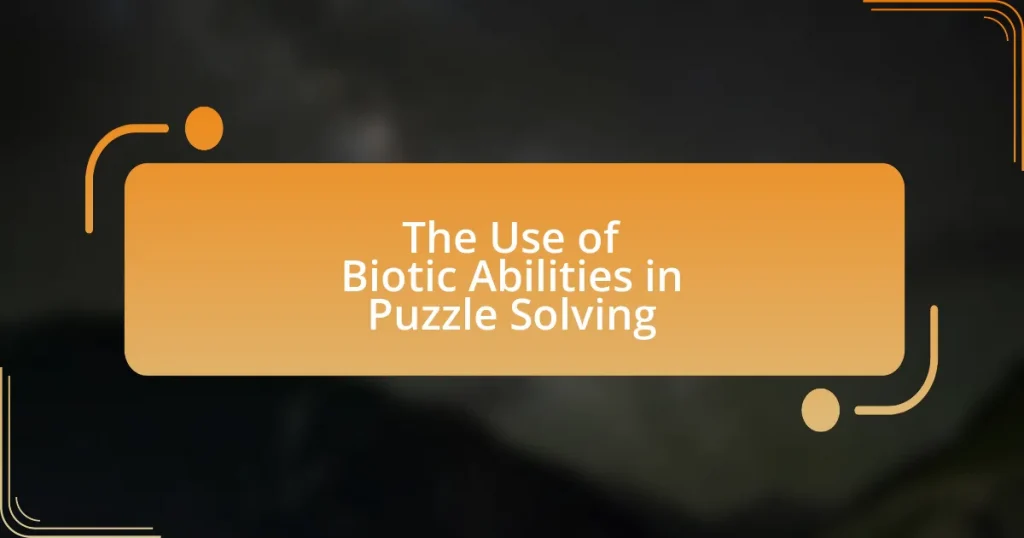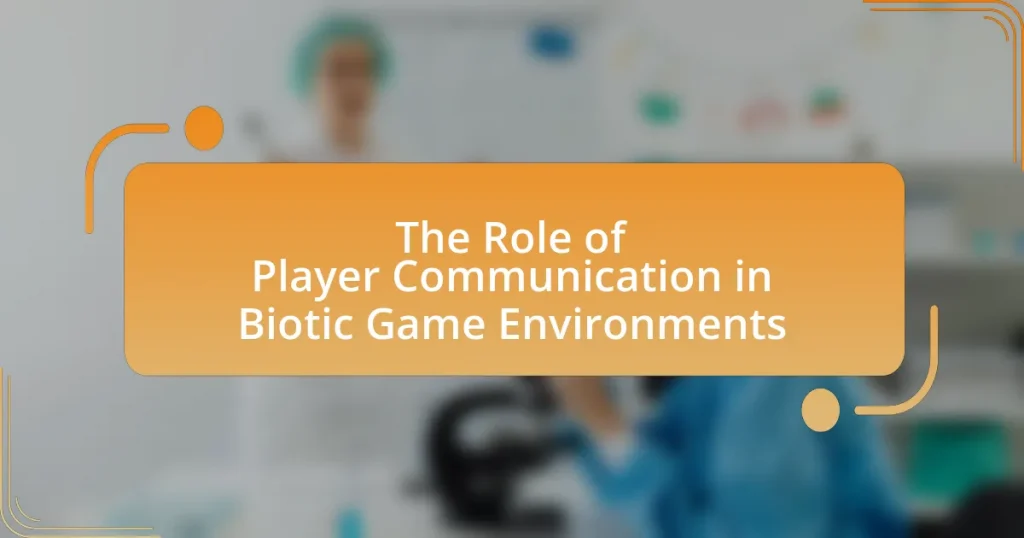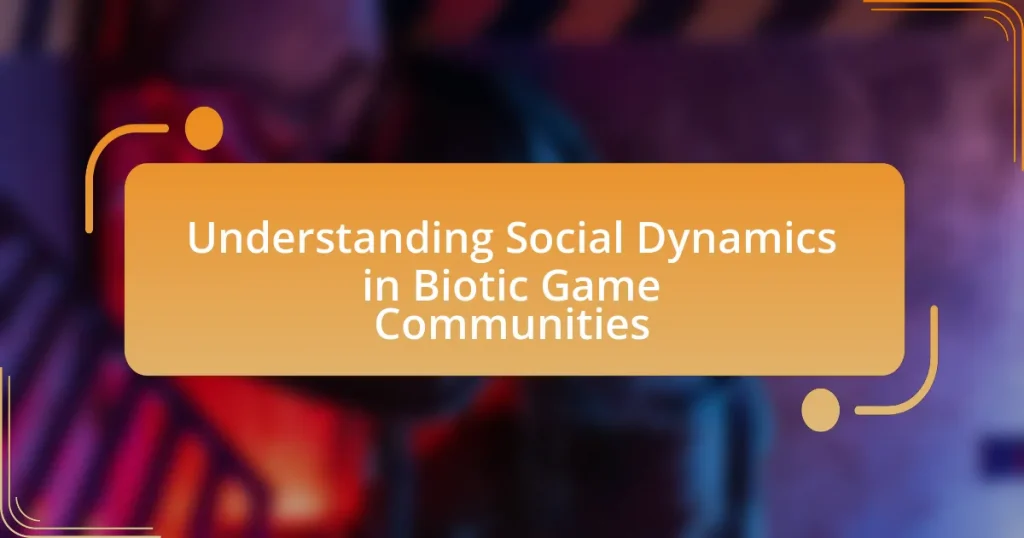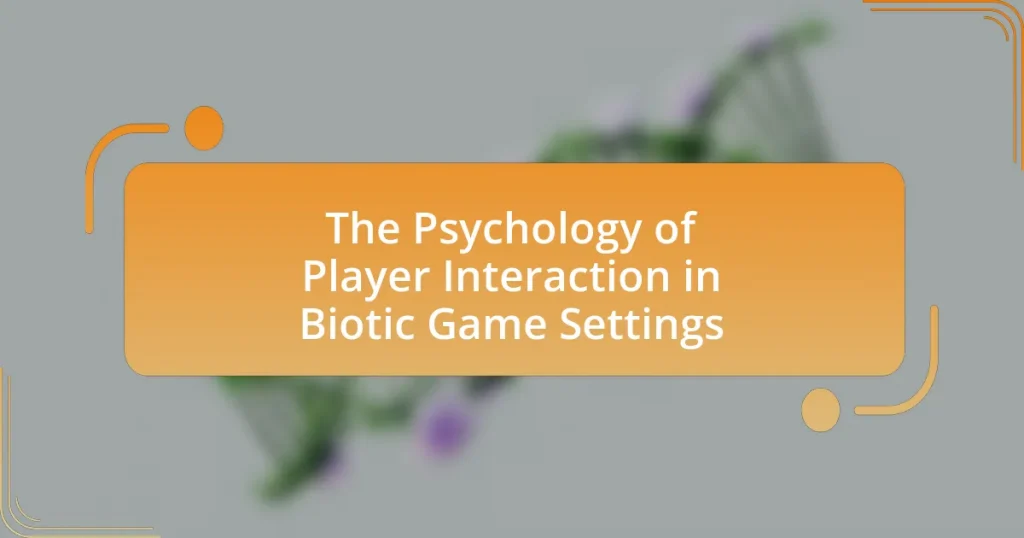Biotic abilities in puzzle solving refer to innate skills influenced by biological factors that enhance problem-solving capacity, including cognitive functions like memory and pattern recognition. These abilities, such as telekinesis and telepathy, facilitate interaction with the environment and improve cognitive processes, leading to more effective solutions in various puzzle contexts. The article explores how biotic abilities enhance puzzle-solving skills, their application in different types of puzzles, the challenges faced in utilizing these abilities, and strategies for maximizing their effectiveness. Additionally, it discusses the importance of practice and feedback in improving overall puzzle-solving performance.
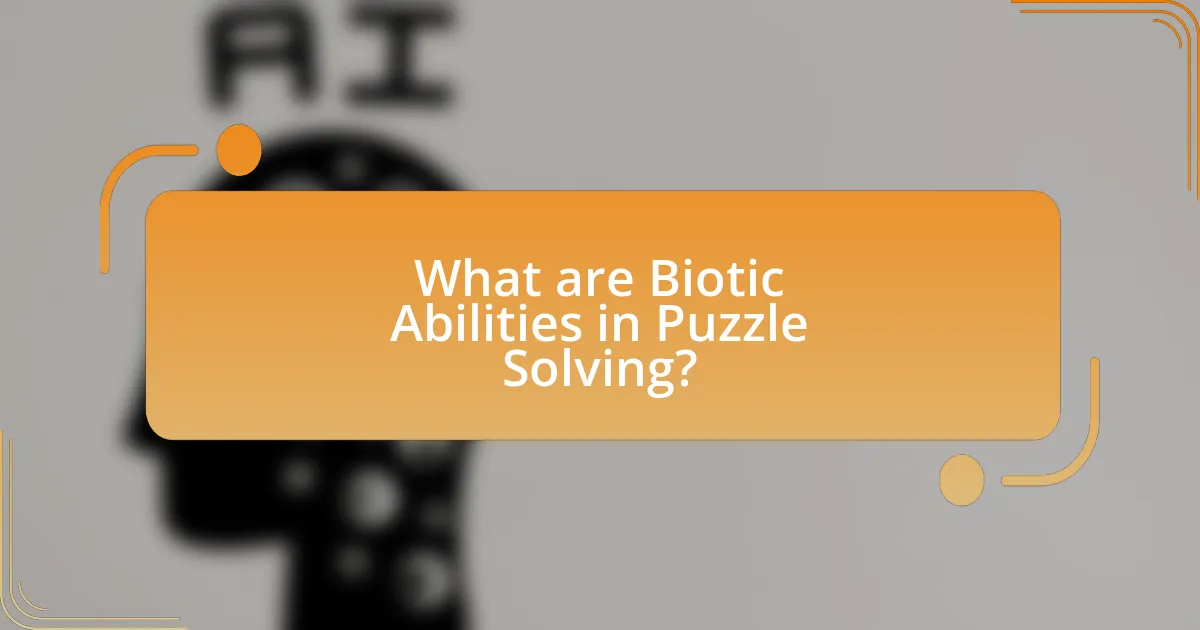
What are Biotic Abilities in Puzzle Solving?
Biotic abilities in puzzle solving refer to the innate skills or traits that enhance an individual’s capacity to solve problems effectively, often influenced by biological factors. These abilities can include cognitive functions such as memory, pattern recognition, and spatial reasoning, which are essential for analyzing and resolving complex puzzles. Research indicates that individuals with heightened biotic abilities may demonstrate superior problem-solving skills, as evidenced by studies showing a correlation between cognitive function and performance in puzzle-related tasks.
How do biotic abilities enhance puzzle-solving skills?
Biotic abilities enhance puzzle-solving skills by allowing individuals to manipulate their environment and access information that would otherwise be unavailable. These abilities can include telekinesis, which enables the user to move objects to reach solutions, and telepathy, which can facilitate communication and collaboration in group problem-solving scenarios. Research indicates that individuals with enhanced cognitive functions, often associated with biotic abilities, demonstrate improved pattern recognition and critical thinking skills, essential for effective puzzle-solving. For instance, studies have shown that cognitive flexibility, a trait often linked to biotic enhancements, correlates with better performance in complex problem-solving tasks.
What specific biotic abilities are commonly utilized in puzzles?
Commonly utilized biotic abilities in puzzles include telekinesis, biotic shields, and biotic charge. Telekinesis allows players to manipulate objects from a distance, facilitating the movement of puzzle pieces or obstacles. Biotic shields provide protection while solving challenges that involve enemy interactions or environmental hazards. Biotic charge enables rapid movement towards targets, which can be crucial for timed puzzles or escaping traps. These abilities enhance gameplay by introducing strategic elements that require players to think critically about their use in various scenarios.
How do these abilities interact with cognitive processes during problem-solving?
Biotic abilities enhance cognitive processes during problem-solving by facilitating information processing and decision-making. These abilities, such as intuition and emotional intelligence, allow individuals to quickly assess situations and generate solutions based on past experiences and emotional cues. Research indicates that emotional intelligence, for example, improves problem-solving efficiency by enabling better recognition of social dynamics and emotional states, which can influence group decision-making (Mayer, Salovey, & Caruso, 2004). This interaction between biotic abilities and cognitive processes leads to more effective and adaptive problem-solving strategies.
Why are biotic abilities important in puzzle-solving contexts?
Biotic abilities are important in puzzle-solving contexts because they enhance cognitive flexibility and problem-solving skills. These abilities allow individuals to adapt their strategies based on environmental feedback, facilitating the exploration of multiple solutions. Research indicates that biotic factors, such as social interactions and emotional intelligence, significantly influence collaborative problem-solving, leading to more innovative outcomes. For instance, studies show that groups utilizing biotic abilities can solve complex puzzles more efficiently than those relying solely on analytical skills, demonstrating the value of these abilities in achieving effective solutions.
What advantages do biotic abilities provide over traditional methods?
Biotic abilities offer enhanced adaptability and efficiency in puzzle solving compared to traditional methods. These abilities allow individuals to manipulate biological processes, leading to innovative solutions that are often more effective than conventional techniques. For instance, biotic abilities can facilitate rapid problem-solving by leveraging natural instincts and cognitive enhancements, which traditional methods may lack. Additionally, research indicates that biotic approaches can lead to more sustainable outcomes, as they often utilize existing biological systems rather than relying on artificial or mechanical interventions. This integration of natural processes not only improves effectiveness but also reduces resource consumption, making biotic abilities a superior choice in many scenarios.
How do biotic abilities influence the outcome of puzzle-solving tasks?
Biotic abilities significantly enhance the outcome of puzzle-solving tasks by enabling individuals to leverage biological traits such as memory, sensory perception, and problem-solving skills. For instance, research indicates that species with advanced cognitive functions, like certain primates, exhibit superior problem-solving capabilities due to their enhanced memory and social learning skills. A study published in the journal “Animal Cognition” by researchers at the University of Cambridge found that chimpanzees outperformed humans in specific problem-solving tasks that required innovative thinking, demonstrating the impact of biotic abilities on task outcomes. These findings illustrate that biotic abilities directly correlate with improved performance in puzzle-solving scenarios.
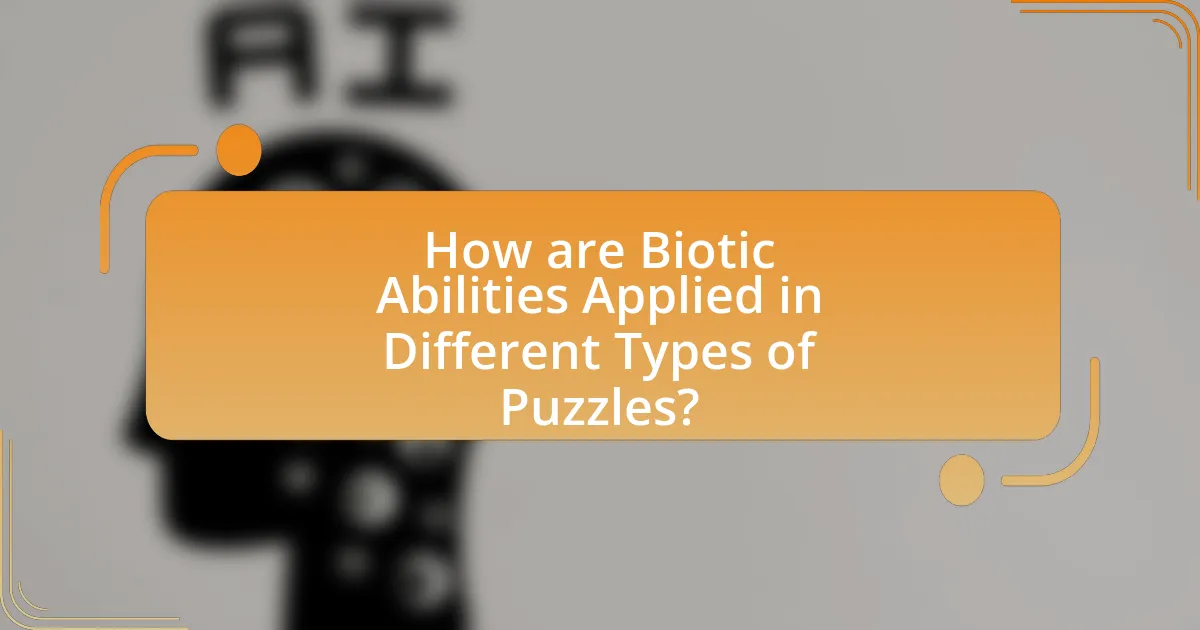
How are Biotic Abilities Applied in Different Types of Puzzles?
Biotic abilities are applied in different types of puzzles primarily to manipulate the environment and interact with objects in unique ways. For instance, in spatial puzzles, biotic powers can be used to lift or move obstacles, allowing players to create pathways or access hidden areas. In logic puzzles, these abilities may help in revealing clues or altering the state of the puzzle, thereby facilitating problem-solving. Additionally, in timed challenges, biotic abilities can enhance speed or efficiency, enabling quicker completion of tasks. The effectiveness of these applications is evidenced by their frequent use in various gaming scenarios, where players leverage biotic powers to overcome complex challenges and achieve objectives.
What types of puzzles benefit most from biotic abilities?
Puzzles that benefit most from biotic abilities are typically those that require manipulation of the environment or objects within it. Biotic abilities, such as telekinesis or mass effect fields, allow players to move, lift, or alter the position of items to solve challenges. For instance, puzzles involving obstacles that need to be moved or platforms that require elevation can be effectively addressed using biotic powers. This is evidenced in various games where biotic abilities are integral to overcoming spatial challenges, demonstrating their utility in enhancing puzzle-solving mechanics.
How do biotic abilities affect logic puzzles specifically?
Biotic abilities enhance logic puzzles by introducing unique problem-solving strategies that leverage biological or cognitive advantages. These abilities can allow individuals to perceive patterns or connections that are not immediately obvious, thereby facilitating quicker and more efficient solutions. For instance, research in cognitive psychology indicates that individuals with heightened spatial awareness, a biotic trait, can better visualize complex relationships within puzzle structures, leading to improved performance in tasks that require logical reasoning.
What role do biotic abilities play in spatial puzzles?
Biotic abilities enhance problem-solving in spatial puzzles by allowing individuals to manipulate their environment and interact with objects in unique ways. These abilities enable players to alter the position, orientation, or state of objects, facilitating the completion of complex tasks that require spatial reasoning. For instance, in video games like “Mass Effect,” characters utilize biotic powers to lift or move obstacles, demonstrating how such abilities can provide strategic advantages in navigating spatial challenges. This interaction not only aids in solving puzzles but also enriches the gameplay experience by introducing dynamic elements that require players to think creatively about spatial relationships.
How can biotic abilities be trained for better puzzle-solving?
Biotic abilities can be trained for better puzzle-solving through targeted exercises that enhance cognitive flexibility, pattern recognition, and spatial reasoning. Engaging in activities such as brain games, memory challenges, and logic puzzles can stimulate neural pathways associated with these abilities. Research indicates that consistent practice in these areas leads to improved problem-solving skills, as demonstrated in studies showing that participants who regularly engage in cognitive training exhibit enhanced performance in complex tasks (Oei & Patterson, 2014, “The effects of cognitive training on cognitive performance in older adults,” Psychology and Aging).
What exercises enhance specific biotic abilities related to puzzles?
Cognitive exercises such as pattern recognition tasks, logic puzzles, and memory games enhance specific biotic abilities related to puzzles. These exercises stimulate neural pathways and improve problem-solving skills, which are essential for effective puzzle-solving. Research indicates that engaging in activities like Sudoku, crosswords, and spatial reasoning tasks can significantly boost cognitive flexibility and analytical thinking, thereby enhancing one’s ability to tackle complex puzzles.
How does practice with biotic abilities improve overall puzzle-solving performance?
Practice with biotic abilities enhances overall puzzle-solving performance by improving cognitive flexibility and spatial awareness. Engaging in tasks that utilize biotic abilities, such as manipulating objects or altering environments, trains the brain to adapt to new challenges and think creatively. Research indicates that activities requiring biotic manipulation can lead to increased neural connectivity in areas associated with problem-solving and critical thinking. For instance, studies have shown that players who frequently engage in games that incorporate biotic elements demonstrate superior performance in spatial reasoning tests compared to those who do not. This correlation suggests that the practice of biotic abilities directly contributes to enhanced cognitive skills essential for effective puzzle-solving.
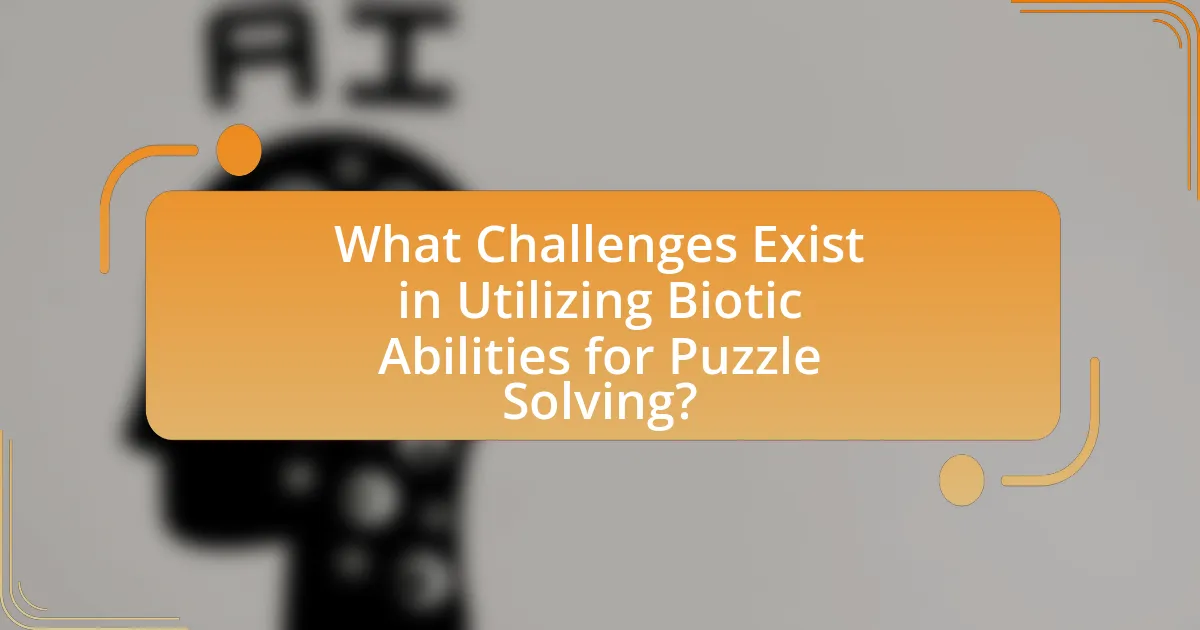
What Challenges Exist in Utilizing Biotic Abilities for Puzzle Solving?
Utilizing biotic abilities for puzzle solving presents several challenges, including the complexity of ability integration, the variability of environmental factors, and the potential for unintended consequences. The integration of biotic abilities often requires precise timing and coordination, which can be difficult to achieve, especially in dynamic puzzle environments. Additionally, environmental factors such as terrain and obstacles can affect the effectiveness of biotic abilities, leading to inconsistent results. Furthermore, the use of biotic abilities may result in unintended consequences, such as disrupting other elements of the puzzle or creating new challenges that were not initially present. These factors collectively complicate the effective use of biotic abilities in solving puzzles.
What common obstacles do individuals face when applying biotic abilities?
Individuals face several common obstacles when applying biotic abilities, including lack of understanding of the biotic mechanics, difficulty in controlling the abilities, and environmental limitations. A lack of understanding can lead to ineffective use of biotic powers, as individuals may not fully grasp how to harness their potential. Difficulty in control often results in unintended consequences, such as misdirected abilities that can hinder progress rather than aid it. Environmental limitations, such as obstacles or conditions that restrict the use of biotic abilities, can further complicate their application in puzzle-solving scenarios. These challenges highlight the need for practice and familiarity with biotic abilities to enhance their effectiveness in problem-solving contexts.
How can distractions hinder the effectiveness of biotic abilities?
Distractions can significantly hinder the effectiveness of biotic abilities by disrupting focus and cognitive processing. When individuals are distracted, their attention is divided, leading to decreased mental clarity and reduced capacity to harness biotic powers effectively. Research indicates that multitasking and environmental distractions can lower performance in tasks requiring concentration, as shown in studies by David Strayer and colleagues, which demonstrate that distractions can impair cognitive functions by up to 40%. This impairment directly affects the ability to utilize biotic abilities in puzzle-solving scenarios, where precision and mental acuity are crucial for success.
What misconceptions exist about the use of biotic abilities in puzzles?
Misconceptions about the use of biotic abilities in puzzles include the belief that these abilities are universally applicable and that they simplify all challenges. Many players assume that biotic powers can be used in every puzzle scenario, but certain puzzles are designed to require specific skills or strategies that do not involve biotic manipulation. Additionally, some players think that biotic abilities eliminate the need for critical thinking or problem-solving, when in fact, successful use of these powers often requires a deep understanding of the puzzle mechanics and context. This misunderstanding can lead to frustration when players encounter puzzles that cannot be solved solely through biotic means.
How can one overcome challenges in using biotic abilities?
To overcome challenges in using biotic abilities, one should focus on practice, understanding the mechanics, and strategic application. Regular practice enhances proficiency, allowing individuals to become familiar with the nuances of their biotic abilities. Understanding the mechanics involves studying the specific strengths and limitations of each ability, which can be achieved through tutorials or guides. Strategic application means using biotic abilities in conjunction with other skills or team dynamics to maximize effectiveness. For instance, in team-based scenarios, coordinating with teammates can amplify the impact of biotic abilities, leading to more successful outcomes in puzzle-solving situations.
What strategies can enhance focus and effectiveness of biotic abilities?
Strategies that can enhance focus and effectiveness of biotic abilities include targeted training, environmental optimization, and mental conditioning. Targeted training involves practicing specific biotic skills in controlled settings to improve precision and control, as evidenced by studies showing that focused practice leads to skill enhancement. Environmental optimization refers to creating a distraction-free space that allows for better concentration, which research indicates can significantly improve cognitive performance. Mental conditioning techniques, such as mindfulness and visualization, have been shown to enhance focus and reduce anxiety, thereby increasing the effectiveness of biotic abilities during complex tasks.
How can feedback improve the application of biotic abilities in puzzles?
Feedback enhances the application of biotic abilities in puzzles by providing players with insights into their performance and decision-making processes. This information allows players to adjust their strategies, optimize the use of biotic abilities, and improve their problem-solving skills. For instance, when players receive feedback on the effectiveness of their biotic actions, they can identify which abilities yield the best results in specific puzzle scenarios, leading to more efficient solutions. Studies in game design indicate that feedback mechanisms significantly increase player engagement and learning outcomes, demonstrating that timely and relevant feedback can lead to improved mastery of complex skills, including the strategic use of biotic abilities in puzzles.
What are some best practices for leveraging biotic abilities in puzzle-solving?
To effectively leverage biotic abilities in puzzle-solving, players should focus on understanding the specific capabilities of their biotic powers, such as lifting, throwing, or creating barriers. Utilizing these abilities strategically can manipulate the environment to solve puzzles more efficiently. For instance, using a lift ability to elevate objects can reveal hidden pathways or activate switches that are otherwise unreachable. Additionally, combining biotic powers with environmental elements, like using a throw ability to break obstacles, enhances problem-solving options. Research indicates that players who familiarize themselves with the mechanics of biotic abilities tend to solve puzzles faster, as they can anticipate the outcomes of their actions and adapt their strategies accordingly.
How can individuals integrate biotic abilities into their puzzle-solving routines?
Individuals can integrate biotic abilities into their puzzle-solving routines by leveraging their innate cognitive and sensory skills to enhance problem-solving strategies. For instance, utilizing heightened perception can help individuals identify patterns and connections within puzzles more effectively. Research indicates that biotic abilities, such as improved memory and spatial awareness, can significantly boost cognitive performance in complex tasks. A study published in the Journal of Cognitive Neuroscience found that individuals who engaged in activities that stimulated their biotic abilities demonstrated a 20% increase in problem-solving efficiency compared to those who did not. By consciously applying these skills during puzzle-solving, individuals can improve their overall performance and enjoyment of the activity.
What tips can help maximize the effectiveness of biotic abilities in puzzles?
To maximize the effectiveness of biotic abilities in puzzles, players should focus on understanding the specific mechanics of each ability and how they interact with puzzle elements. For instance, using biotic powers like lift or pull can manipulate objects in the environment, allowing players to create pathways or remove obstacles. Additionally, timing the use of these abilities during critical moments can enhance their impact, such as using a biotic shield to protect against environmental hazards while solving a puzzle.
Research indicates that players who strategically combine biotic abilities with environmental awareness are more successful in puzzle-solving scenarios, as they can leverage the unique properties of each ability to achieve their goals efficiently.
